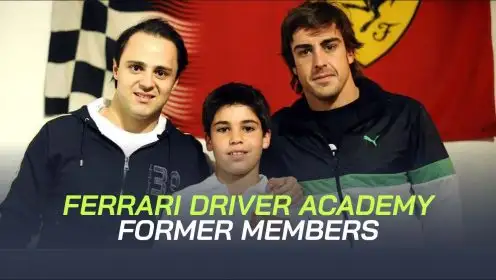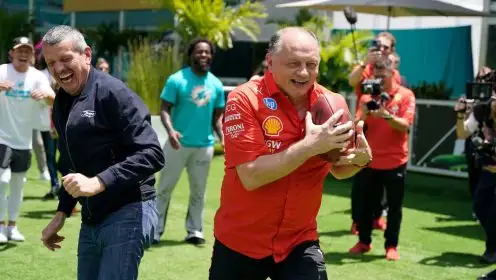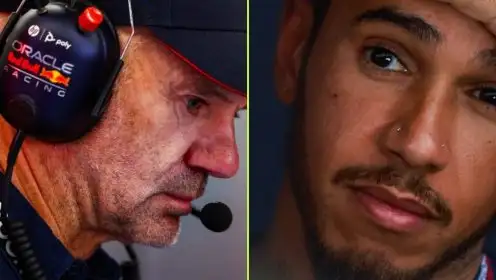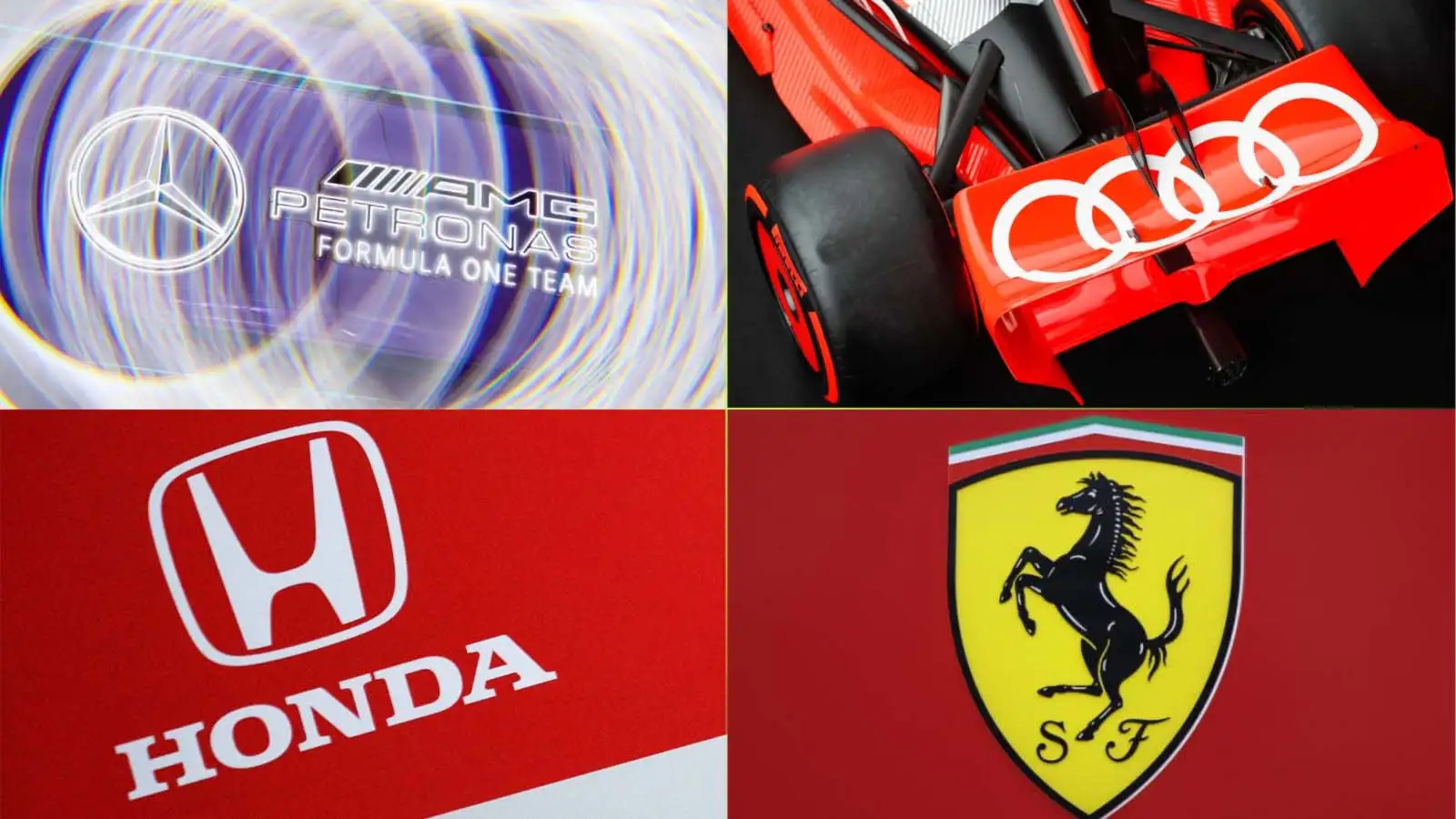Villeneuve Pironi: An unrelenting tragedy through the eyes of their families
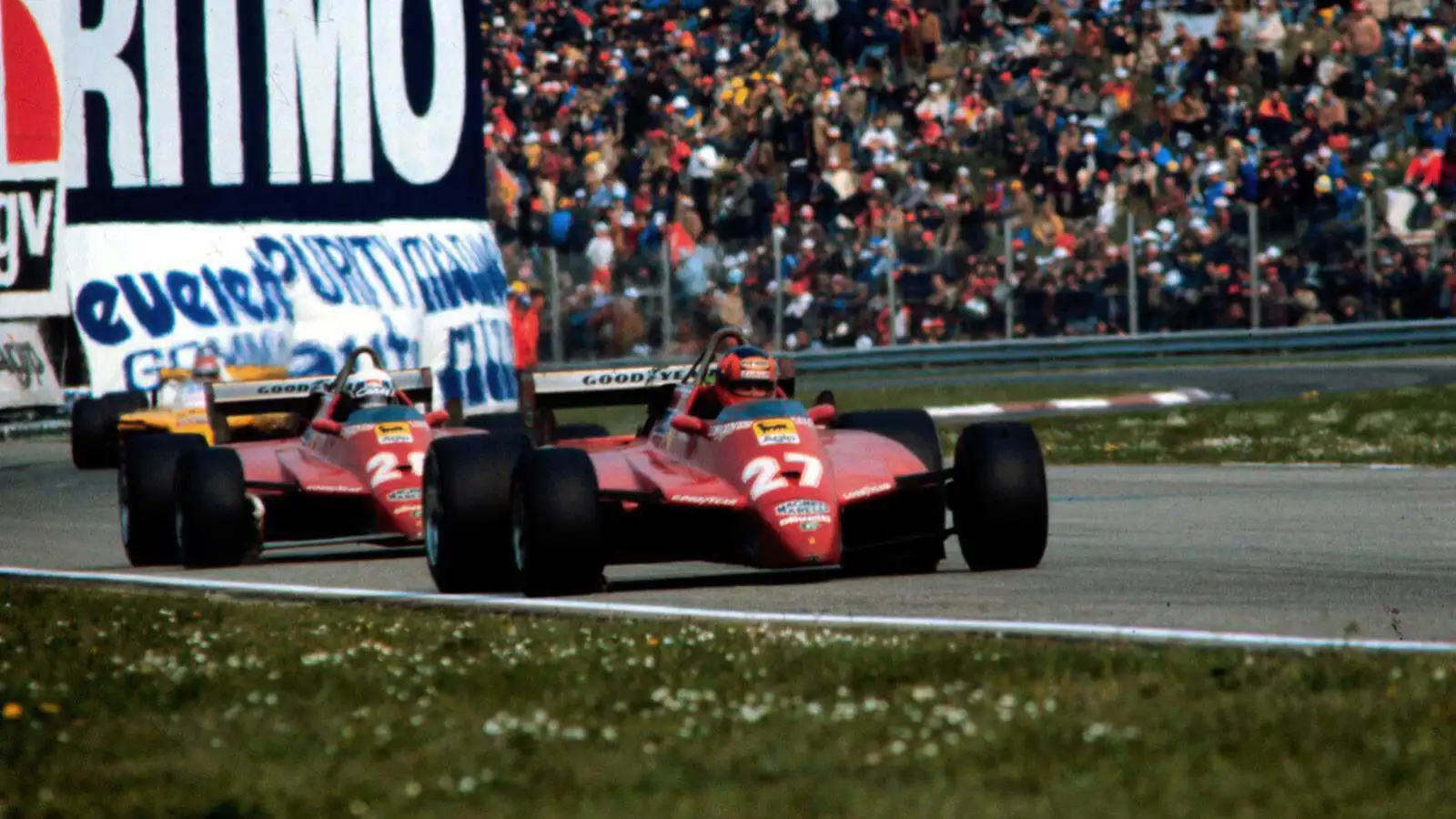
Ferrari's Gilles Villeneuve leads Didier Pironi on track at Imola 1982.
The tragic story of Gilles Villeneuve and Didier Pironi has been told in a documentary film. 40 years on, it’s a wound that hasn’t healed for either family.
“Destiny wanted this. Destiny led them to have the same accident,” are haunting words uttered by Pietro Corradini, Didier Pironi’s mechanic, as he reflects on the career-ending crash that was merely the latest in cataclysmic tragedies that hit Formula 1 in 1982.
It was at Hockenheim that season, in a dark and gloomy wet practice session, that the short-lived story of Gilles Villeneuve and Didier Pironi within F1’s sphere came to an end, as the French driver collided with the rear of Alain Prost’s Renault and was sent skyward before his Ferrari dug itself into the ground and inflicted grievous injuries upon Pironi’s legs.
The crash came just three months after Gilles Villeneuve had died, in strikingly similar circumstances, as the French-Canadian was thrown from his car after making contact with Jochen Maas’ March during qualifying for the Belgian Grand Prix. Villeneuve had been doing his utmost to beat the qualifying time set by Pironi, as their fight with each other for the championship had turned ugly just two weeks prior.
The San Marino Grand Prix at Imola had seen an intra-team battle for the win between Villeneuve and Pironi, an all-Ferrari affair at the front following problems for Renault and the tensions seen at the height of the FISA-FOCA war. Villeneuve, leading, made a small error that Pironi jumped on to overtake for the lead, with an ensuing, and seemingly good-natured, scrap for the benefit of the home crowd turning sour as Pironi crossed the line to claim the win – breaking what had been a gentleman’s agreement internally at Ferrari after the team had issued instruction for their cars to slow down and hold position with Villeneuve in the lead.
Having been friends up until this point, Villeneuve was enraged by Pironi’s apparent betrayal and Ferrari’s failure to publicly back him in the wake of the disagreement. Still burdened by the emotions of Imola, Villeneuve was pushing hard to overcome Pironi’s lap time in qualifying at the next race when his story came to an abrupt end.
It’s one of F1’s most well-known stories and a scenario that has played out on many occasions since: that of two boisterously friendly teammates turning on each other when victory becomes a possibility. Only, on this occasion, with F1 yet to go through its safety revolution, it was a story that merely ended in heartbreak – first with Villeneuve’s fatal crash and quickly followed by Pironi’s own accident.
Villeneuve Pironi: Racing’s Untold Tragedy set for March release
From March 18th, UK viewers will be able to watch a new documentary feature film focusing on the story. Titled Villeneuve Pironi: Racing’s Untold Tragedy, the film will be launched on Sky Documentaries, and has been produced by the Noah Media Group and directed by Torquil Jones – the director behind the 2021 documentary ’14 Peaks: Nothing Is Impossible’ and 2018’s Bobby Robson biopic ‘More Than A Manager’.
At over 90 minutes, Villeneuve Pironi is an unflinching and emotional look back over the lives and careers of both men, showcasing Villeneuve’s early dabbling in snowmobile racing and Pironi’s victory at Le Mans in 1978.
Building up through their early F1 careers and on into the bitterness of 1982, the documentary pieces together the story using previously unseen archive footage (including the fight at Imola) as well as home video that offers glimpses into the personalities that were Gilles and Didier. Made with the full co-operation of both the Villeneuve and Pironi families, there are plenty of emotional cutaways as Joann Villeneuve, as well as children Jacques and Melanie, remember Gilles.
Pironi is remembered by Catherine Bleynie, who he married in 1982 before their break-up a year later, as well as his later girlfriend Catherine Goux, while other speakers include Marco Piccinini, Ferrari sporting director, the now sadly departed Mauro Forghieri, and Enzo Ferrari’s secretary Brenda Vernor. There are also appearances from Goux’s children, Gilles and Didier – the latter now works for Mercedes in Formula 1.
As well as the archive footage, director Torquil Jones manages to capture an era-authentic feel for reconstructed footage which is peppered masterfully in – viewers will scarcely be able to tell the difference between the genuine article and what Jones has made specifically for the film.
Dealing with Villeneuve’s fatal crash is no easy task, and Jones isn’t one to shy away from the realities of what occurred during those few traumatic moments: there’s no tasteful fade to black as Villeneuve is thrown from his cartwheeling Ferrari. Nor are viewers given any distance from the grotesque outcome of Pironi’s accident, as Jones captures the stark atmosphere of a bleak and foreboding Hockenheim, while Pironi’s fatal powerboating accident in 1987 is also covered with a level of detail previously unseen.
It’s also clear that, 40 years on, the thick tension that existed between Villeneve and Pironi still lingers on between their respective partners, with Joann Villeneuve making her thoughts very clear that this is a story of “betrayal and dishonesty” – a stance that hasn’t softened despite the intervening years. It’s a stance that Goux understands, albeit disagrees with, as both sides agreed to speak with PlanetF1.com ahead of the film’s release.
Catherine Goux: The movie is the last chance for my children to see their father existing
Goux, Pironi’s girlfriend at the time of his death in 1987, had been a sweetheart of Pironi in his early F1 years, with the pair reconnecting after his marriage to Catherine Bleynie fell apart in the months following his Hockenheim accident.
Goux was pregnant with twins at the time of Pironi’s death, and would give birth while stricken with grief: she named them Gilles and Didier, having sought permission from Joann Villeneuve to do so.
“Maybe happy is not the word, but I am happy that the film is finalised and is now ready to be seen,” she says, when asked about whether she’s pleased to see the final outcome.
“It was a very difficult choice for me to accept to do the documentary because it’s been a very long time after Didier’s death. I didn’t want my children to be embarrassed by anything that could happen, and I also avoided this world for a very, very long time. But I made the choice after speaking with my children, and I decided that it had to be done because I thought there was a story out of my personal thoughts. Because I thought that they had a great similarity, both of them.
“I accepted to do this movie also because when I met John McKenna (CEO of Noah Media Group), he really was very, very thoughtful. I knew where the story was going to go after doing plenty of early interviews with the team. After time, I was quite surprised that I could speak about it deeply.
“I have accepted that this movie is going [public] and it’s the last chance, maybe, for my children to see their father existing in this world today.
“With my boys, their father never saw them. They didn’t exist, so he doesn’t quite exist for them. I thought it was good for them to see him. We also don’t speak a lot of Didier. Sometimes we hear things on the Formula 1 when we are at Monza or Imola, so I thought this would be a good thing to show them.”
Joann Villeneuve reveals a similar initial hesitancy about the project: “I did hesitate a long time to do this. I’ve been asked to do it many, many times throughout the years. I finally accepted, but it was still very difficult. I just find that it’s a very difficult period of time, not only for me, but for a lot of people. When I meet people today, they still have strong feelings about that episode.
“I guess, after 40 years, it was time to do it. On top of everything, the people I worked with, Torquil [Jones] was just a really nice guy. He was just the kind of person that made it comfortable for me to do.”
Is “betrayal” a fair word to use when remembering Imola 1982?
Given their opposing perspectives on how the friendship between Gilles and Didier broke down, I asked Catherine for her thoughts on Joann’s use of the words “betrayal” and “dishonesty” regarding her late partner’s actions at Imola in 1982, particularly in light of Joann’s in-film reveal that she had had misgivings about Pironi’s honesty in conversations with her husband.
“Joann doesn’t want to hurt anyone but, of course, she hurts me and my children with that word: it’s a word that’s very, very strong. Maybe all the anger after 40 years surprised me, but also not really,” Goux said.
“Sometimes the sorrow, the pain, you can hold this idea all the time. For her, Didier gives her the reason why Gilles is dead, but this is not the case. This makes me sad for her, because I understand her pain – it’s never gone. It’s good to put this on something because you don’t want to accept the reality too much that, to be a racer, you have to accept that life is a little more dangerous than for the normal person.
“Why I accepted to do the documentary was not to prove that Didier didn’t betray, I think it’s for the people to see, and to think when they see.
“If you see Formula 1 today, I see that today we see this all the time. Knowing Didier, he would never have betrayed anyone. But he said perfectly: he’s there to win the race.
“I think, at the end, maybe Joann put all the fault on Didier. Gilles was hurt because Ferrari took the side of Didier, and I think this was not a betrayal, and this was not easy for Gilles. But to say it was the fault of Didier, it doesn’t make me cross or whatever – I respect what she thinks. But I don’t think the same, and I’m not hurt by what she says.”
Villeneuve, while softly-spoken and friendly, shows an icier side when I ask her about her perspective on the accuracy of the portrayal of both men in the movie, particularly regarding whether she felt Pironi had been presented in a sympathetic light.
She freely admits there’s bias to her thinking, an admirable admission, when I ask her whether she’s been able to find peace with the outcome of the story in the intervening forty years since her husband’s death.
“That part of it was done a long time ago. It still remains difficult, and it still remains with feelings of betrayal and lack of honesty,” she explains.
“But you make your peace with things. You can’t stay in anger all of your life – it’s just a very destructive emotion. But it still remains, the emotion itself of betrayal still remains, because those are core values that both Gilles and I have. So it’s just that part of it that remains because of our core values.
“[The film is] accurate, I guess. It’s difficult for me to answer that kind of question, because I’m biased about it. Obviously, when you lose the love of your life, you remain with the biases about who he was and how he was and so I guess it’ll always be that. My opinion will always be biased about it. So it’s difficult for me. Even if I take a step back, I will still have biases.
“Gilles, on the track, could be ruthless as a driver. But, as a man, he remained with his core values of loyalty and honesty, and could be trusted. Those are two, in my mind, different things. Because, when we look at the race between Rene Arnoux and Gilles in Dijon [in 1979], it was ruthless. But they both trusted each other. They both were loyal to this friendship they had, so they remained that way throughout the race, whereas Imola was a different way of thinking.”
I asked Joann about Imola 1982, the cataclysmic race that destroyed their friendship, and she spoke about how Gilles had struggled to come to terms with how he had felt betrayed by Pironi.
“There had been [an agreement], and it had been spoken about before the race,” she says.
“[Didier] just went against everything that had been spoken about. That had been team… not rules, but there were team agreements inside the team, and he just went against it. Whereas Gilles never did. So I think that’s the bigger part of the betrayal, and the bigger part of the race, and the bigger part for Gilles to see Pironi could not be trusted, which was the harder part.
“Because, for him, a handshake was a contract. You knew that if he gave you a handshake, gave you his friendship, he wouldn’t ever negate on it.”
Might Pironi and Villeneuve eventually have patched up their falling out?
Given the nature of how Villeneuve and Pironi fell out, it’s obvious that the filmmakers are keen not to present Villeneuve as the protagonist with Pironi as the antagonist. After all, refusing to acknowledge or adhere to a team instruction may be villainous within the context of the sport but, as the likes of Sebastian Vettel, Max Verstappen, and Lewis Hamilton/Nico Rosberg have shown in recent years, it’s a matter that usually resolves itself through the passing of time and increasing maturity.
I asked Goux about whether she is happy with how Pironi is presented, given that the crux of the issue between the two drivers largely focuses on Pironi going against the gentleman’s agreement at Imola in 1982.
“I would have liked in the documentary to have a section to have conversations with his friends and with his team, because he was very liked by his team,” she says.
“He was very liked by everyone, he was very close to everyone at the table. But, when he was in the car, he was completely determined.
“When you see what Gilles and Didier did, all the things that were completely amazing, they amused themselves – they were like boys going to the very edge. When you see the race at Imola, the most important thing is to see people were hysterically happy about the fight they had at the end, because it was the spectacle they were waiting for. It was quite fun and, for the two drivers, the crowd were hysterically happy – it was still at the beginning of the championship.
“Didier was sure that this story would be one week of headlines and, after that, it would be the end of the story. He didn’t take this very seriously. Of course, he was also furious that Gilles reacted like that. It’s not something we talked about a lot. But unfortunately, destiny decided on something else.
“Didier was never aggressive anyway, to anyone. He was very calm, very excited, very happy. When you have a fight with someone, it’s best to wait a little bit even with your husband or wife! We need a little time to talk about it. But Gilles was very, very angry about it.
“Drivers – they don’t like to lose, they don’t like to be second. For them, it’s awful, and maybe Gilles took this very, very badly. If Didier, afterward, had been reprimanded by Ferrari, this would have been completely different. Even Enzo Ferrari said they were big enough to deal with this themselves.”
Had destiny been kinder, and Gilles and Didier lived to see their rivalry fade, would the pair have rekindled their friendship? Again, the two sides have very different views.
“Oh yes, Didier was a very good friend,” Goux says.
“It’s very difficult because life sometimes, you see people, it’s quite a difficult life to be drivers as you move all the time. You’re not at home all the time, you can’t have a life like anyone. Didier really liked Gilles. Really, he was devastated when he died. It was terrible.”
Villeneuve is certain that her husband would not have ever reconciled with his teammate when I ask if an olive branch could have been extended in time.
“No, I don’t think so. Gilles was who he was, 100%,” she explains.
“There was no halfway – if he liked you, he liked you. If he didn’t, he didn’t. He didn’t really question his emotions. So, once he had turned the page, it was done, it was over. He would not have gone back on it.
“From Gilles’ side, it was over and done. He had turned the page on that friendship. Everyone saw it more as anger, but it was more disappointment. A very deep, deep disappointment about everything he thought was true. Of course, there was anger but that’s not the main sentiment he had – it was really the other part of it too, the disappointment.”
Having initially felt disappointed by Ferrari’s lack of support for him, Villeneuve is sure that Gilles’ disappointment with his team would have also faded in time.
“He was a very forgiving person also,” she says.
“He was a very kind, gentle person so, eventually, I think the Ferrari part of it [would have faded] because he would have seen it through Mauro’s eyes. He was close to Mauro Forghieri and I think that he knew that, had Mauro been at the race, things might have been very, very different.”
Might the movie help bring peace between the two families?
With both women left bereft by their respective losses, five years apart, I ask both whether there has been much contact between them in the intervening 35 to 40 years.
“I’ve never had any contact with Joann,” Goux says.
“The only contact I had with her was when my twins were going to be born. I asked her if she has a problem if I named my boys Didier and Gilles. On my mantle, I have a picture of Enzo Ferrari with Gilles and Didier on each side. I asked her and she was quite shocked. That was the only time I speak with her, and I never spoke with her again.
“My boys have contact with Jacques, which is very good, they like Jacques a lot. That’s the only contact.
“I’m very solitary. I don’t think she would like to have more contact. I respect her, I don’t really want to meet her, but I don’t want not to meet her if you know what I mean? She was never in my life. I understand, so much, her pain. I’m a very open woman and I’m very happy to see people. But I don’t know what I can bring her, I would never try to explain to her that maybe she can open her mind differently with Didier.”
Goux also reveals that, the year before Didier’s death, Pironi and Joann had a conversation after bumping into each other while on holiday.
“Didier and Joann met a very, very long time after Gilles’ death, in St. Tropez, in around 1986,” she says.
“He spent about two hours with her – it was the first time he saw her after Gilles’ death. He was very moved to have seen her. They talked, and I remember he was very, very touched to have met her again. That’s all that I can say: that he was happy to see her and see that things were going quite well.”
While Catherine seems to indicate a willingness to engage with the Villeneuves, if desired, Joann explains that, due to Goux not being romantically involved with Pironi at the time of Imola 1982, she never felt much need to reach out.
“No, not really, no,” she said.
“There was no real need, or not need… just things happen. You have to understand that Catherine was not part of Didier’s life when it happened, and the boys were born much later. So it wasn’t as if they were part of it in the beginning anyways.
“Catherine was told about the event by Didier. And then she, after that, told the story to the boys, so it’s difficult to see or understand what they got out of it.
“I have to say that I’m at peace with it. Many more people will be aware of the story, that’s the positive part of the whole thing with the documentary, where more people will be aware of it so many years later. The people that were there at the time were there to give their opinion about it. Yeah, that’s a good side of it.”
Read next: Exclusive: The inside story of Caterham’s collapse in F1


